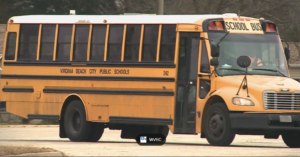The Virginia Beach School Board will vote tomorrow.
The announced subject will be transgender rights in schools.
It is couched by The Virginian-Pilot as the school board defending transgender students against “unnecessarily cruel policies.“ As opposed, one supposes, to necessarily cruel policies.
The local paper refers, of course, to the Youngkin administration’s “Model Policies” on the subject. Which, like their predecessors from the Northam administration, are not mandatory, so need not be debated at all.
The School Board debate is at its core constitutional.
You will note that the Youngkin Model Policies linked its constitutional interpretations to court decisions. The Northam version did not. Northam’s just asserted what the constitution meant. Must have been an oversight.
My take:
- Families are responsible for shaping the values, beliefs, and personalities of children;
- Government is required to protect children from abuse and neglect. But government schools are not allowed to substitute their judgements on values and beliefs for those of the families;
- They are most certainly not permitted to define parental moral or political disagreements with school personnel as emotional abuse at home. Or as harassment of government schools or teachers;
- And government schools, absent evidence of abuse or neglect, must never be allowed to substitute their own moral judgments for those of parents.
But that’s just me. Not a lawyer.
You note I did not say of what parental values and beliefs should consist.
America is a free country. It is a constitutional republic whose constitution limits the rights of government.
At least on paper.
The progressive press, which is now nearly all of it, is in full-throated rage against parents who do not submit passively to progressive intrusion in the teaching in school of values that defy their own.
Abuse and neglect of children, carefully defined in law and policy in Virginia, are grounds for suspension of parental rights and custody and for criminal prosecution. The schools report a lot of the abuse and neglect that is dealt with by social services. The laws are enforced.
Those are good things.
But Virginia law on abuse and neglect of children does not include “emotional abuse.” For good reason: the term is ripe for political definition.
One parent’s teaching of moral standards to his or her children may be another’s definition of emotional abuse.
A “start from scratch” test. If readers formed their own republic, would they write a new constitution that limits the rights of government or of the people?
Would they give priority in the raising of children to limiting the rights of parents or the rights of government?
Would their new constitution guarantee parents the right to raise their children to their own standards, and would their laws deny them that right only in circumstances of abuse and neglect?
That is the constitution and Virginia laws we currently have.
Or would a new constitution allow government to remove children from parental control for political or social reasons? By defining political disagreement as abuse. Because government knows better?
Many countries have been down that road. To the sorrow of their people.
Bottom line. The two different “Model Policies” cited above each claim support in the U.S. Constitution and law. Sometimes in the same provisions and laws.
Read the competing claims at the links if you wish.
You will note that the Northam administration found more “flexibility” in the constitution than did the Youngkin administration. The Northam version gained room to “innovate” in interpretation by avoiding inconvenient precedent.
Progressives flee from the topic of constitutionality by deflecting the questions raised here. They change the subject.
But constitutional freedoms are the context of current school board debates. They are not really about “Model Policies.”
Never were.


Leave a Reply
You must be logged in to post a comment.